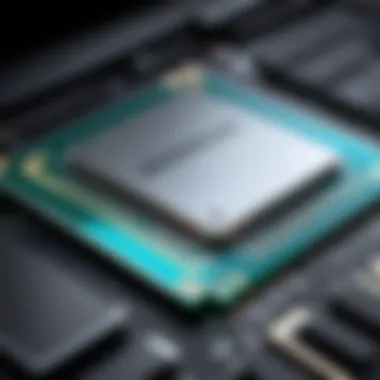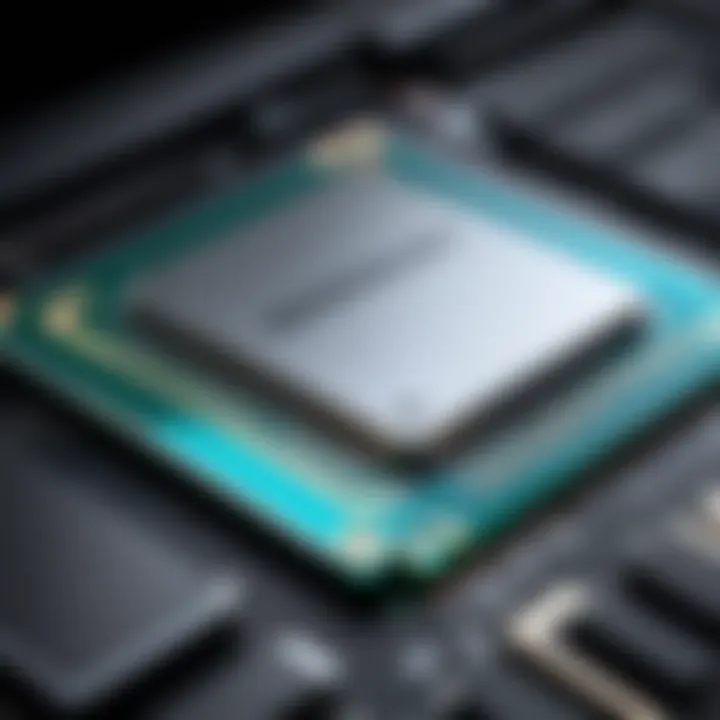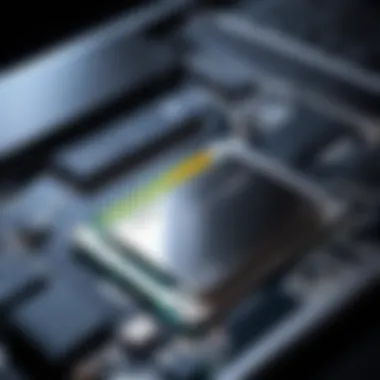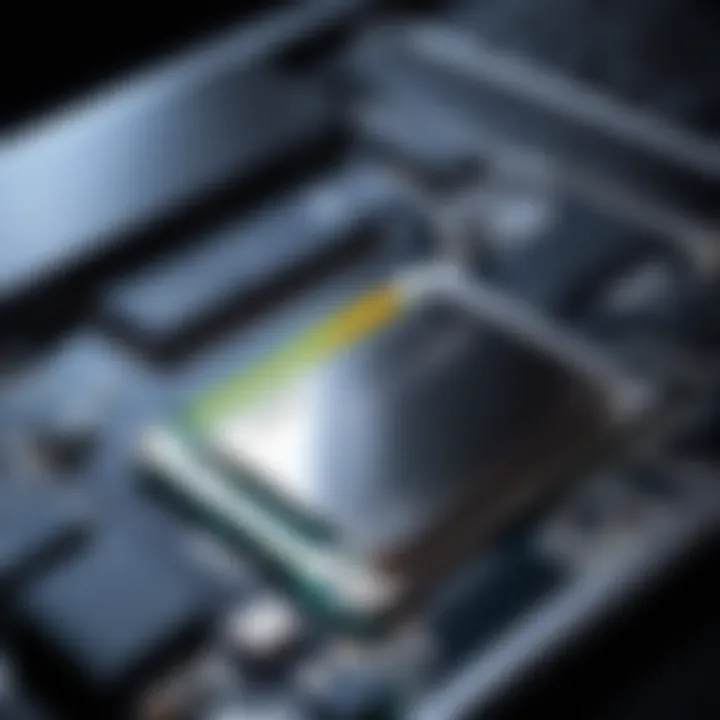Boost Your Laptop's Performance: A Guide to Enhancing RAM


Product Overview
In this section, we will delve into the specifics of upgrading the RAM in your laptop. Understanding the brand of your laptop is crucial before proceeding with any upgrades to ensure compatibility and effectiveness. Knowing the key specifications of your laptop, such as the current RAM capacity and the maximum supported RAM, is essential for a successful upgrade. Pricing is also a significant factor to consider when planning the RAM enhancement of your laptop to make a cost-effective decision.
Performance Comparison
For those pondering a RAM upgrade, conducting benchmark tests to measure the speed and efficiency gains is imperative. Comparing the before and after performance metrics will provide concrete data on the impact of the RAM enhancement. By analyzing speed and multitasking efficiency pre and post-upgrade, users can discern the tangible benefits of increasing their laptop's RAM capacity.
Features and Technology
Exploring the unique features of RAM modules and the technological advancements in RAM technology is vital. Understanding the compatibility of RAM with other devices ensures seamless integration and optimal performance. Delving into the intricacies of RAM technology can empower users to make informed decisions when upgrading their laptop's RAM.
Pros and Cons
Evaluating the strengths and weaknesses of upgrading your laptop's RAM is essential for making an informed decision. Recognizing the potential performance improvements as a strong point can motivate users to proceed with the upgrade. At the same time, being aware of any drawbacks or areas for improvement, such as compatibility issues or cost implications, can help users approach the upgrade process cautiously.
Value for Money
Considering the cost-effectiveness and long-term benefits of a RAM upgrade is crucial. Assessing how the enhanced performance aligns with the investment made in upgrading the RAM determines the value for money. Comparing different RAM options and similar products can aid users in making a well-informed decision that optimizes both performance and financial considerations.
Introduction
RAM, or Random Access Memory, is a critical component in a laptop that significantly impacts its performance and multitasking capabilities. As we delve into the intricate world of upgrading RAM in laptops, it becomes imperative to comprehend the underlying importance of enhancing this vital aspect. Increasing RAM allocation can lead to noticeable improvements in your device's speed, responsiveness, and overall efficiency, making it a pivotal consideration for users seeking to optimize their computing experience.
Understanding the Significance of RAM
-### Role of RAM in Laptop Performance RAM's role in laptop performance is paramount as it serves as the temporary storage space that the system relies on to execute tasks efficiently. By having an ample amount of RAM, the laptop can access and process data swiftly, leading to smoother performance and faster computing speeds. This is particularly beneficial for tasks that require significant memory usage, such as multimedia editing or gaming applications where quick data retrieval is vital for seamless operation. -### Impact of RAM on Multitasking Multitasking is an essential aspect of modern computing, and RAM plays a crucial role in enabling a smooth multitasking experience. With sufficient RAM capacity, the laptop can juggle multiple applications simultaneously without experiencing lags or slowdowns. This is advantageous for individuals who frequently work on multiple projects or have numerous tabs open, allowing for seamless transitions between tasks and boosting overall productivity.


Benefits of Increasing RAM
-### Enhanced Speed and Responsiveness Augmenting RAM capacity in a laptop can lead to enhanced speed and responsiveness, resulting in quicker system startup times, reduced loading durations for applications, and overall smoother performance. This increased speed not only improves user experience but also contributes to enhanced productivity by reducing waiting periods and allowing for swift task execution. -### Improved System Stability One of the key benefits of increasing RAM is the improvement in system stability. With additional memory, laptops can handle resource-intensive tasks more efficiently, preventing system crashes or freezes often experienced with insufficient RAM. This enhanced stability ensures uninterrupted workflow and minimizes disruptions, making it a valuable investment for users seeking a reliable and robust computing environment.
Precautions Before Upgrading RAM
-### Checking Laptop Compatibility Before upgrading RAM, it is essential to verify your laptop's compatibility with the new memory modules. Ensuring that the RAM specifications match your device's requirements prevents potential incompatibility issues, system errors, or performance hitches post-installation. Compatibility checks also help in determining the maximum RAM capacity your laptop supports, aiding in making informed purchasing decisions. -### Backing Up Important Data Prior to initiating the RAM upgrade process, backing up critical data is crucial to safeguard important files and prevent data loss in case of any unforeseen events. Data backup acts as a safety net, ensuring that valuable information remains secure throughout the upgrade process, mitigating the risk of potential data loss scenarios. By proactively creating backups, users can proceed with the upgrade with confidence and assurance of data safety.
Steps to Upgrade RAM
In the realm of laptop optimization, few enhancements can rival the impact of upgrading RAM. The advent of this technological breakthrough has revolutionized personal computing. RAM (Random Access Memory) serves as the bedrock upon which laptop performance rests. Its influence permeates every facet of digital functionality, from executing tasks at lightning speed to facilitating seamless multitasking endeavors. By delving into the intricacies of upgrading RAM, users can unlock a realm of possibilities that redefine their computing experience.
Determining Current RAM Configuration
Checking Installed RAM Capacity
The first pivotal step in the upgrading journey involves assessing the installed RAM capacity of your laptop. This fundamental task casts a spotlight on the existing memory resources, laying a crucial foundation for the subsequent upgrade process. By understanding the current RAM capacity, users can pinpoint potential deficiencies, enabling them to make informed decisions regarding the necessary upgrades. Checking the installed RAM capacity acts as a gateway to optimizing laptop performance, ensuring that the chosen modifications align seamlessly with the device's capabilities.
Identifying Type of RAM
Another indispensable aspect of upgrading RAM revolves around identifying the type of RAM compatible with your laptop. This step delves into the nuanced intricacies of memory modules, shedding light on the specific requirements essential for a successful upgrade. By discerning the type of RAM best suited for your device, users mitigate compatibility issues and streamline the installation process. Understanding the unique characteristics of different RAM types empowers individuals to make tailored selections that harmonize effortlessly with their laptop specifications.
Purchasing Compatible RAM Modules
Researching Suitable RAM Options
Navigating the vast expanse of RAM options necessitates diligent research to identify modules that align with your laptop's requirements. Thorough exploration of available RAM configurations equips users with the knowledge needed to make informed purchasing decisions. By delving into the intricacies of various RAM options, individuals can pinpoint modules that offer optimal performance enhancements, propelling their laptops to new heights of efficiency.
Ensuring Compatibility with Laptop


Ensuring the compatibility of selected RAM modules with your laptop stands as a critical preparatory step before embarking on the upgrade process. Validating the harmony between chosen RAM modules and your device specifications is foundational to a successful upgrade endeavor. By scrutinizing compatibility factors, users safeguard against potential errors or performance issues, guaranteeing a seamless integration of the new memory modules into their laptop system.
Preparing for Installation
Gathering Necessary Tools
Embarking on the installation journey necessitates an arsenal of tools tailored for the task at hand. Gathering crucial tools such as screwdrivers and anti-static wrist straps lays the groundwork for a smooth and efficient upgrade process. By assembling the requisite tools in advance, users ensure a hassle-free installation experience, minimizing disruptions and maximizing efficacy.
Creating a Clean Workspace
Establishing a pristine workspace provides the optimal environment for conducting the RAM upgrade with precision and care. A clean workspace free of clutter and static electricity fosters a conducive setting for delicate hardware manipulations. By creating a structured workspace, individuals set the stage for a successful RAM installation, enhancing their ability to execute the upgrade process seamlessly.
Installing New RAM Modules
Opening Laptop Case
Delving into the heart of laptop hardware, opening the laptop case marks the initiation of the physical upgrade process. This step demands caution and meticulous attention to detail to ensure the integrity of internal components. By navigating the intricacies of laptop anatomy, users pave the way for a seamless RAM installation, setting the stage for enhanced performance and productivity.
Inserting RAM Correctly
The precise insertion of new RAM modules constitutes a pivotal stage in the upgrade process, underlining the importance of proper installation techniques. Ensuring the correct alignment and gentle insertion of memory modules is paramount to guaranteeing optimal functionality post-upgrade. By adhering to best practices for inserting RAM, users safeguard against potential damages and technical malfunctions, culminating in a successful memory upgrade.
Testing and Verifying Upgrade
Booting Up Laptop
Upon successful installation of new RAM modules, booting up the laptop signifies a critical juncture in the upgrade process. This pivotal moment unveils the effects of the upgrade, emphasizing the tangible improvements in performance and responsiveness. By initiating the boot-up sequence, users witness firsthand the fruits of their labor, validating the success of the RAM upgrade endeavor.


Checking System Properties
Verifying the upgraded RAM's integration into the system properties offers concrete validation of the installation process's effectiveness. By delving into the system properties and confirming the augmented RAM capacity, users solidify their understanding of the upgrade's impact. Checking system properties serves as the final litmus test, affirming the successful integration of new memory resources and heralding a new era of enhanced laptop performance.
Optimizing RAM Performance
In the context of this article, optimizing RAM performance is of utmost importance to enhance the overall functionality and speed of a laptop. By focusing on optimizing RAM, users can significantly boost their system's efficiency and multitasking capabilities. One key element of optimizing RAM performance is adjusting virtual memory settings, which plays a crucial role in how the system manages data and applications.
Adjusting Virtual Memory Settings
- Understanding Virtual Memory: Virtual memory serves as an extension of a computer's physical memory (RAM), allowing the system to run more applications than the actual RAM can support. This aspect of virtual memory is vital as it directly impacts the system's ability to handle multiple tasks simultaneously. The unique feature of virtual memory lies in its ability to create a page file on the hard drive to store data when RAM runs low, ensuring smoother operations. However, excessive use of virtual memory can lead to reduced performance due to the slower retrieval of data compared to RAM.
- Setting Virtual Memory Size: Setting the virtual memory size involves configuring the space allocated on the hard drive to act as virtual memory. By adjusting the virtual memory size, users can fine-tune their system's performance based on their specific usage requirements. The key characteristic of setting virtual memory size is optimizing it to strike a balance between maximizing system efficiency and preventing performance degradation. While increasing virtual memory size can improve multitasking capabilities, excessively large virtual memory sizes may impact system responsiveness negatively.
Managing Startup Programs
- Disabling Unnecessary Startup Programs: Disabling unnecessary startup programs is crucial for optimizing system performance. These programs load during system startup and consume valuable memory and processing power, potentially slowing down the overall performance. The key characteristic here is the ability to enhance boot-up speed and reduce system resource consumption by preventing unnecessary applications from running in the background. However, care must be taken not to disable essential programs that are required for smooth system operation.
- Utilizing Task Manager: Task Manager is a powerful tool that allows users to monitor and manage running processes and programs on the system. By utilizing Task Manager, users can identify resource-intensive applications and terminate them to free up RAM and CPU usage. The key characteristic of Task Manager is its real-time monitoring capability, providing insights into system performance and facilitating proactive resource management. However, improper use of Task Manager can lead to system instability if critical processes are mistakenly terminated.
Regular Maintenance and Updates
- Performing Disk Cleanup: Performing regular disk cleanup helps in optimizing system performance by removing temporary files, cache, and unnecessary data that accumulate over time. The key characteristic of disk cleanup is its ability to free up valuable storage space and improve system responsiveness. However, users should be cautious as deleting critical system files accidentally during disk cleanup can result in system errors or malfunction.
- Installing System Updates: Installing system updates is essential for maintaining system security, stability, and performance. System updates include patches, bug fixes, and feature enhancements that address vulnerabilities and enhance compatibility with new software. The key characteristic of installing system updates lies in ensuring that the system is up to date with the latest improvements and security enhancements. However, users should be aware that installing updates without proper verification or from untrustworthy sources can introduce malware or cause system errors.
Conclusion
In the realm of laptop optimization, the significance of the conclusion cannot be overstated. As users delve into the intricacies of increasing their laptop's RAM, this final section serves as the culmination of their efforts, encapsulating the key takeaways and benefits garnered throughout the process. The conclusion acts as a beacon of insight, guiding users towards the realization of enhanced performance and efficiency, highlighting the transformation their device has undergone.
Enjoying Enhanced Laptop Performance
Realizing Speed Improvements
When it comes to realizing speed improvements on your laptop through RAM enhancement, the impact is profound and far-reaching. This crucial aspect directly influences the overall speed and responsiveness of your device, enabling swift execution of tasks and seamless multitasking capabilities. The key characteristic of speed improvements lies in the noticeable reduction of loading times for applications and software, fostering a smoother and more efficient computing experience. Users opt for this enhancement for its ability to elevate the operational speed of their laptop significantly, translating into enhanced productivity and reduced latency during workflow. The unique feature of speed improvements lies in its compatibility with various computing activities, ensuring a fluid and uninterrupted performance across a spectrum of tasks.
Maximizing System Efficiency
The facet of maximizing system efficiency through RAM expansion is paramount in the pursuit of optimal laptop performance. This crucial element is geared towards streamlining the functioning of the entire system, reducing bottlenecks, and enhancing the overall responsiveness of the device. The key characteristic of system efficiency optimization is its ability to utilize available resources judiciously, thereby enhancing the operational capacity of the laptop without unnecessary strain. Users opt for this approach due to its proven track record of maximizing workflow efficacy and system stability, resulting in a seamless computing experience. The unique feature of system efficiency optimization lies in its sustainable impact on long-term system functionality, ensuring consistent performance levels and mitigating potential lags or system crashes.
This comprehensive guide on increasing laptop RAM not only enhances the speed and multitasking abilities but also paves the way for an enriched computing experience, where performance and efficiency are diligently optimized.







